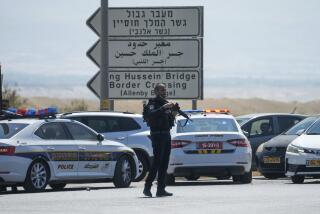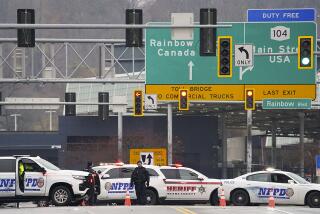W. Bank Blast Kills 2 Palestinians; Militants Say Israelis Were Target
- Share via
JERUSALEM — A fiery explosion tore through a crowded West Bank checkpoint on Jerusalem’s northern outskirts Wednesday, killing two Palestinians and injuring 19 other people, Israelis and Palestinians alike.
Israeli authorities said they believed Palestinian militants had intended to use the explosives to stage an attack inside Jerusalem, but instead set off the payload when Israeli forces arrived to investigate.
There has not been a bombing in Jerusalem in nearly six months, since a suicide attack aboard a rush-hour bus Feb. 22 killed eight passengers. But Israeli security officials say that since the start of the year, they have foiled nearly 200 attacks, about half of those would-be suicide bombings.
The Al Aqsa Martyrs Brigade, a Palestinian militant group, claimed responsibility for the midafternoon explosion near the Kalandia checkpoint, which is used daily by thousands of Palestinians to cross between Jerusalem and the West Bank town of Ramallah. The group, an offshoot of Palestinian Authority President Yasser Arafat’s Fatah faction, expressed regret over the Palestinian casualties, saying it had targeted Israelis.
The thunderous blast shook a heavily congested stretch of road just south of Kalandia, setting at least two cars on fire and leading Israeli officials to initially suspect a car bomb had been used. Later, authorities said the explosives apparently were in a bag that was left in a taxi parking lot and detonated by remote control as border police approached.
Israeli officials said that just before the blast, security forces had converged on the scene, where a roadblock had been set up after an intelligence warning that an attacker was en route to Jerusalem via the Ramallah road. Though such “hot alerts” -- information suggesting an attack is imminent -- are common, this warning was highly specific, security sources said.
Witnesses said the blast sent a fireball billowing skyward and kicked up a blinding cloud of black smoke and dust.
“There was a very, very big explosion, and I woke up in the hospital,” said 42-year-old Atta Raweideh, a parking lot attendant who suffered shrapnel wounds to his leg and shoulder. He said that moments before the blast, border police had been asking taxi drivers and their passengers whether anyone knew who owned a black bag lying nearby.
“We were deafened by the sound of the explosion, and our car caught on fire -- we jumped out of it,” said 40-year-old Fayzeh abu Heideh, who was driving by with her husband, daughter, sister and three children.
The dead were identified by Palestinian hospital officials as Salah abu Sneineh, in his late 50s, and Ayed Abed-Rabbo, 45, both from nearby West Bank villages. Abu Sneineh was driving when the blast hit, Abed-Rabbo was on foot, witnesses said.
Outside Ramallah’s main hospital, Abu Sneineh’s wife, Zakyeh, wept into her mobile phone as she told relatives what had happened. Her shoes were covered with blood.
“Is that him? Is that him?” she screamed as hospital attendants approached with a stretcher carrying a body wrapped in a blood-spattered white blanket. Other hospital staff gently led her away.
The couple’s 6-year-old grandson, Mahdi, was in critical condition after surgery, hospital officials said.
In all, Palestinian medical officials said, 12 people had injuries that required hospital treatment. Israel reported seven wounded, all of them members of the border police.
Ilan Franco, a Jerusalem deputy police commander, said Israeli undercover units had been operating in the area, along with border police and army units, at the time of the blast.
“Our working assumption is that as a result of our presence, the bomb went off prematurely, preventing an attack that was apparently intended for the city of Jerusalem,” he told Israeli radio.
Zakariya Zubeidi, an Al Aqsa commander in the West Bank, said in a statement that the attack was intended to avenge Israel’s recent killings of several of the group’s leaders and field operatives. Israeli security sources said the would-be suicide bomber was from Jenin, Zubeidi’s base.
“The action is not directed against the Palestinian people,” the statement said. “The occupation that makes them wait at checkpoints is responsible for the casualties.”
Israeli authorities are sometimes reluctant to specify the amount of explosives used in an attack, but a firefighter said the fierceness of the fires set off by the blast suggested a “sizable amount.” Palestinian witnesses said the bomb was filled with shrapnel that included live bullets.
Hours after the explosion, the checkpoint remained closed, and hundreds of Palestinians were stranded on either side as darkness fell.
Special correspondent Maher Abukhater in Ramallah contributed to this report.
More to Read
Sign up for Essential California
The most important California stories and recommendations in your inbox every morning.
You may occasionally receive promotional content from the Los Angeles Times.













